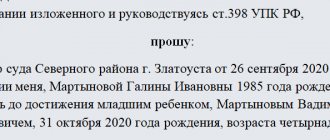Replacing a fine in a criminal case with compulsory work
Galina! Let's look at the situation in order!
Firstly, the sanction of Article 264.1 of the Criminal Code of the Russian Federation provides for punishment in the form of a fine in the amount of two hundred thousand to three hundred thousand rubles or in the amount of wages or other income of the convicted person for a period of one to two years with deprivation of the right to hold certain positions or engage in certain activities for for a term of up to three years, or compulsory work for a term of up to four hundred eighty hours with deprivation of the right to hold certain positions or engage in certain activities for a period of up to three years, or forced labor for a term of up to two years with deprivation of the right to hold certain positions or engage in certain activities for a term up to three years, or imprisonment for up to two years with deprivation of the right to hold certain positions or engage in certain activities for up to three years.
So, when assigning a punishment to your husband, the state prosecutor in the debate while supporting the state prosecution will ask to impose a punishment taking into account Art. 6, 43, 60 of the Criminal Code of the Russian Federation, as well as the judge, when passing a sentence, will also be guided by these norms and will take into account the degree and nature of the public danger of the crime he committed, information about the personality of the husband, the presence of mitigating aggravating circumstances (if any are established), behavior him after committing a crime, as well as the impact of the imposed punishment on the correction of the convicted person and on the living conditions of his family. This concerns sentencing and sentencing. Therefore, the punishment may not necessarily be a fine! I would still recommend waiting for the court verdict, which will certainly describe everything!
The next nuance is that with regard to the development of events when a verdict is passed on your husband with a penalty imposed in the form of a fine, the court will in any case determine its size, taking into account the severity of the crime committed and the husband’s property status, as well as taking into account the possibility of him receiving income.
This is also directly stated by the Plenum of the Supreme Court on the practice of imposing criminal punishment by courts No. 58 of 2015, namely in paragraph 6 it is said that based on the provisions of Part 3 of Article 46 of the Criminal Code of the Russian Federation, a fine can be imposed both without installments and with installment payment up to five years. When imposing a fine with installment payment, the court must justify its decision in the verdict and determine specific terms for payments in installments, taking into account the provisions of Part 3 of Article 31 of the Criminal Executive Code of the Russian Federation (hereinafter referred to as the Penal Code of the Russian Federation), as well as the amount (size) of payments within the limits established by the court term.
If, as you say, and you are convinced that a fine will be imposed, then the development of events in case of non-payment of the fine will be as follows___
According to clause 3.1 of the Resolution of the Plenum of the Supreme Court of the Russian Federation dated January 11, 2007 No. 2 (as amended on December 3, 2013) “On the practice of imposing criminal punishment by the Courts of the Russian Federation” in accordance with Part 1 of Art. 32 of the Penal Code of the Russian Federation, a convicted person is considered to be maliciously evading payment of a fine if he has not paid the fine without installments within 30 calendar days from the date of entry into force of the sentence, or the first part of the fine with installment payment within the same period, or the remaining parts of the fine no later than the day of each subsequent month.
Within the meaning of the law, the establishment of conditions other than payment of the fine on time (for example, repeated warnings to the convicted person by bailiffs about the possibility of replacing the fine with another type of punishment, taking away explanations about the reasons for non-payment of the fine, providing information about the property status of the convicted person and the sources of his income) to recognize a convicted person as maliciously evading payment of a fine is not required. This resolution clarifies to the courts that the mere fact that a convicted person does not have funds cannot be recognized as a valid reason for failure to pay a fine on time.
Any other development of events is possible when imposing a punishment, in your case, based on the personality of your ex-husband, the presence of child support, lack of work, disability in the debate and the last word in court, I recommend strongly saying that any punishment can achieve the stated goals of punishment in Part 2 of Article 43 of the Criminal Code of the Russian Federation, and therefore let him ask the court to take into account that he (the ex-husband) can be reformed without actually serving a sentence. And whether it will be a fine, or conditional imprisonment using the provision of Article 73 of the Criminal Code of the Russian Federation on conditional sentencing, this is, of course, for the court to decide; now we cannot say what punishment the court will impose, since the judge is guided not only by the norms of the law, but also by his own personal convictions, so at the trial your husband needs to convince the judge to impose a fair, minimal punishment!
A competently delivered speech during the debate and the last word is a guarantee of a fair verdict, so as not to appeal it later!
Call
Did the answer help you? Yes No
How are correctional labor assigned?
According to Art. 50 of the Criminal Code of the Russian Federation - correctional labor is assigned to a convicted person who has a main place of work, as well as to those who do not have one. That is, both those who work and those who do not work. A convicted person who has a main place of work serves correctional labor at his main place of work.
A convict who does not have a main place of work serves correctional labor in places determined by local government bodies, in agreement with the penal inspection, but in the area of the convict’s place of residence.
Appointed for a period from 2 months to 2 years. From the salary of a person sentenced to correctional labor, a deduction is made to the state income in the amount established by a court verdict, ranging from 5% to 20%.
In case of malicious evasion of a convicted person from serving correctional labor, the court may replace the unserved sentence:
- forced labor;
- imprisonment, at the rate of 1 day of forced labor or 1 day of imprisonment for 3 days of correctional labor.
If our mandatory work is measured in hours, here it is measured in days. Correctional work, like imprisonment, can be suspended. Not assigned to persons recognized:
- disabled people of group I;
- pregnant women;
- women with children under 3 years of age;
- military personnel undergoing military service under conscription, as well as military personnel undergoing military service under a contract in military positions as privates and sergeants, if they have not served the statutory period of conscription service at the time of the court’s verdict.
The type of punishment is quite light. When recalculating failure to comply with negotiations in the form of correctional labor or compulsory labor, forced labor is equivalent to imprisonment.
Only courts of first and appellate instances can replace a fine with a warning.
Customs fined the company 100,000 rubles for providing an invalid declaration of conformity for the goods during the customs declaration of goods (Part 3 of Article 16.2 of the Code of Administrative Offenses of the Russian Federation).
The company, believing that the fine was imposed without taking into account the actual circumstances, went to court.
She asked to reduce the fine to 10,000, taking into account the following:
- after registering the customs declaration, she herself discovered that there was a typo in the declaration in the article number of the goods and a declaration with the correct article was submitted to the customs authority, and the decision to refuse to release the goods was made by the customs authority after the submission of the declaration of conformity with the correct article;
- the imported products meet the necessary technical requirements, that is, the products are safe for the end consumer, and therefore there is no significant threat to protected public relations;
- the company had no intention of declaring false information when declaring, since the necessary permitting document was submitted to the customs authority before the refusal to release the goods and before drawing up a protocol on the administrative offense.
However, all these arguments were rejected and in the cassation appeal the company pointed to Art.
4.1.1 of the Code of Administrative Offenses of the Russian Federation and asked to replace the fine with a warning. citing the fact that the cassation court has limited competence, which does not include establishing the circumstances of the case and assessing the evidence in the case. DECISION of the Arbitration Court of the Moscow District dated January 11, 2017 No. F05-19676/2016
Editor’s note:
the stated position was confirmed by the Supreme Court of the Russian Federation: “in general, the issue of reducing sanctions is related to the assessment of evidence in the case, which is within the competence of the courts of first and appellate instances” (Resolution dated November 10, 2016 No. 302-AD16-14642).
Legal advice will help replace a fine with a warning
If there are unfulfilled decisions imposing administrative penalties in the form of an administrative fine
We recommend taking advantage of the opportunity to replace a fine with a warning as it improves the situation of a person brought to administrative responsibility for the review of cases of administrative offenses.
The lawyers of the Shmeleva and Partners administrative and legal business defense group have significant experience in successfully representing clients in cases of administrative offenses and will help in replacing an administrative fine with a warning if appropriate circumstances exist.
Our lawyers are ready to provide the necessary legal support on all issues related to the above issues.
WE ARE READY:
- Conduct an analysis of the factual circumstances of the case.
- Assess the prospects of any categories of cases of administrative offenses at any stage of proceedings.
- Ensure business protection during inspections.
- Challenge the result and legality of the inspection.
- Replace the fine with a warning.
You will receive the most effective protection of your interests in administrative offense proceedings. We will help optimize the administrative measures applied - we will reduce the fine or replace it with a warning. Find out more detailed information in consultation with an administrative offenses lawyer:
To get a consultation
Legal article from:
There is no need to apply for a warning
The Code of Administrative Offenses of the Russian Federation stipulates that a fine for an administrative offense committed for the first time must be replaced with a warning, regardless of the presence of a petition from the person held accountable.
At the same time, the company (IP) can undertake documentary evidence that the offense was committed for the first time. After all, according to Part 1 of Art. 25.1 of the Code of Administrative Offenses of the Russian Federation, a person against whom an administrative case is being conducted has the right, in particular, to get acquainted with all its materials, give explanations, and present evidence.
When determining the primacy of an administrative offense, the courts indicate that one of the grounds for replacing a fine with a warning is the failure to previously bring a small or medium-sized business entity to administrative responsibility for committing a similar offense.
LETTER of the Federal Tax Service of the Russian Federation dated December 22, 2016 No. SA-4-7/24729
Replacing a fine with a warning does not apply to violations during state registration
The Federal Tax Service believes that the provisions of the recently introduced Part 1 of Art.
4.1.1 of the Code of Administrative Offenses of the Russian Federation on replacing a fine with a warning are not applicable to Parts 3-5 of Art. 14.25 of this code – about fines for violations during state registration of a company or individual entrepreneur. The service explains it as follows.
Part 1 art. 4.1.1 states that if a company or individual entrepreneur belonging to the category of small or medium-sized business commits for the first time an offense identified during the implementation of state control (supervision), responsibility for which is provided for by the Code of Administrative Offenses of the Russian Federation, then instead of a fine they should only be given a warning.
In parts of 3-5 tbsp. 14.25 provides for liability for late submission of information about a company or individual entrepreneur and submission of false information during state registration.
At the same time, relations in connection with the state registration of legal entities during their creation, reorganization, liquidation and when amending the charter, as well as in connection with the maintenance of the Unified State Register of Legal Entities and the Unified State Register of Individual Entrepreneurs, are regulated by Law No. 129-FZ dated 08.08.2001.
This law, like any other regulatory legal acts, does not provide for the exercise by the Federal Tax Service of state control (supervision) in the field of state registration of legal entities and individual entrepreneurs.
LETTER of the Federal Tax Service of the Russian Federation dated November 8, 2016 No. GD-4-14/ [email protected]
Editor's note:
this original interpretation of the law, unfortunately, does not stand up to criticism.
Offenses to which Part 1 of Art. 4.1.1 Code of Administrative Offenses of the Russian Federation, are listed in Part 2 of the same article. Parts 3-5 tbsp. 14.25 of the code is not among them. Therefore, the rule on replacing a fine with a warning applies to these parts.
As for the lack of control powers of the Federal Tax Service in the field of state registration, then:
- firstly, it does not matter which government agency (Federal Tax Service or another) has such powers, since if Art. 14.25 of the Code of Administrative Offenses of the Russian Federation, which means that some government agency is authorized to monitor compliance with those legal requirements for violation of which this article provides for punishment;
- secondly, the Federal Tax Service still has such powers, since, for example, in Part 1 of Art. 23.6 of the Code of Administrative Offenses is written in black and white: “The federal executive body that carries out state registration of legal entities and individual entrepreneurs considers cases of administrative offenses provided for in parts 3 and 4 of Article 14.25 of this Code.”
Moreover, the Federal Tax Service itself, in its letter dated June 25, 2014 No. SA-4-14/12088, provided detailed instructions for initiating cases under this article.
If the tax authority at the place of registration of the legal entity identifies sufficient data indicating the presence of an administrative offense event in the form of submission of documents containing deliberately false information about the address (location) of the legal entity, the documents are sent to the registering authority within 5 working days to draw up a protocol under Part. 4 tbsp. 14.25 of the Code of Administrative Offenses of the Russian Federation, and in the absence of evidence of deliberate falsity of the information provided - under Part 3 of Art. 14.25 Code of Administrative Offenses of the Russian Federation.
In the event that the functions of the registering authority and the tax authority are carried out by one tax authority, the activities specified in this letter are carried out by this tax authority.
The question arises: on what basis of legislation was this letter written, if, as the Federal Tax Service claims, neither Law 129-FZ nor other regulatory legal acts provide for the Federal Tax Service to exercise state control (supervision) in the field of state registration of legal entities and individual entrepreneurs?
Filing a petition to replace a fine with a warning
You can download the application form to replace an administrative fine with a warning at the link: Petition to replace an administrative fine with a warning for an administrative offense
You have 10 days from the date of delivery of the penalty order to file a petition to replace the fine with a warning.
There are no strict requirements for the execution of such an application in the law, and it is written in free form, by hand.
WHAT SHOULD BE REQUIRED:
- Justification that your offense did not cause harm to the life and health of people, animals, plants and the environment, cultural heritage sites, state security, and that it did not pose a threat to emergency situations.
- Describe that the company committed an offense for the first time.
- Write that there is no property damage.
It is important to know that you are not required to file a petition. The Code of Administrative Offenses of the Russian Federation does not contain requirements for the need to submit an application or petition by the person brought to justice to replace the punishment.
This means that auditors must replace the fine with a warning, even if the head of the company does not ask for it.
However, we recommend that you do so as it is in your best interest. Since civil servants rarely take the initiative. A petition will greatly increase the chances that the fine will be replaced with a warning.
When drafting a petition, you can seek help from a lawyer. With its help, it will be easier to collect all the necessary documents and correctly compose an application.
Contact a lawyer
But you can always apply above and try to challenge the administrative liability yourself.







